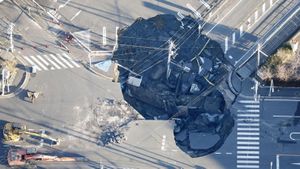Dozens of prosecutors have been let go from the U.S. Justice Department as President Donald Trump's administration follows through on promises to retaliate against those involved in investigations related to the January 6, 2020, insurrection at the U.S. Capitol. This latest wave of dismissals is part of Trump’s broader strategy to reshape federal law enforcement agencies.
Reports indicate Trump is not just targeting prosecutors; there have been significant changes at the Federal Bureau of Investigation (FBI) as well. On Friday, the administration continued its reshuffling of personnel with the firing of high-ranking agents, leading to speculation about who might be next on the chopping block. Meanwhile, there are temporary leaders filling the void at both the Justice Department and the FBI.
According to Politico, the career civil servants at the Justice Department received abrupt notifications of their termination via email on Friday evening. All who were dismissed had played roles in prosecuting the hundreds of cases stemming from the January 6, 2021, events. Renowned legal expert and former U.S. Attorney Joyce Vance remarked, “Firing prosecutors because of cases they were assigned to work on is just unacceptable. It’s anti-rule of law; it’s anti-democracy.”
Among those let go was David Sundberg, the head of the FBI’s Washington Field Office, who managed sensitive national security and counterintelligence matters. More dismissals are anticipated as the administration appears to be systematically reviewing the contributions of FBI personnel to the investigations concerning Trump.
A request from acting Deputy Attorney General Emil Bove included demands for identifying thousands of FBI employees who contributed to investigations related to Trump's tenure. Bove, who has represented Trump legally, directed acting FBI Director Brian Driscoll to compile names, roles, and details of the involvement of these employees. Notably, the criteria for assessing personnel determined their involvement with Trump’s various legal battles.
“For each employee included in the lists, provide the current title, office to which the person is assigned, their role in the investigation or prosecution, and the date of last activity relating to the investigation or prosecution,” Bove stated. The processing of this information will be pivotal for determining any additional personnel actions needed.
Officials fired received letters stating the confidence of the department's leadership concerning their capabilities was diminished due to their direct involvement with prosecutions against Trump. One letter reportedly conveyed, “You played a significant role in prosecuting President Trump,” indicating the administration's stance on perceived loyalty among its ranks. The impact of these dismissals could extend far beyond individual careers, raising questions about the future of law enforcement at the federal level.
Despite facing mounting criticism from legal analysts, Trump framed the firings as necessary steps to rectify what he described as corruption within the FBI. “They were very corrupt people, very corrupt, and they hurt our country very badly,” Trump stated, thereby justifying the drastic purge to align the department with his administration's vision.
The sweeping changes are not limited to the Justice Department and FBI. Recent weeks have seen multiple dismissals of officials involved with various investigations related to Trump, including various federal inspectors general. Reports suggest these decisions are characterized as “cleaning house” by the administration, with the intent to remove personnel deemed untrustworthy or misaligned with Trump’s agenda. Hannibal “Mike” Ware, the chairman of the Council of Inspectors General on Integrity and Efficiency, has expressed concerns, indicating such actions “are not legally sufficient.”
The legal and political ramifications of these dismissals cannot be overstated. Experts worry about the erosion of professional conduct within federal agencies and the potential chilling effect on future investigations. By targeting those who pursued inquiries against Trump, there are fears of setting dangerous precedents surrounding accountability and oversight.
While Trump has maintained publicly his unawareness of specific dismissals, his administration has been relentless. Earlier this week, the Justice Department dismissed several officials tied to the inquiry concerning Trump’s mishandling of classified documents as well as efforts to undermine the 2020 election results. These actions are compounding suspicions about the integrity of the Department of Justice.
The shakeup not only raises immediate questions about law enforcement’s ability to function impartially but also leaves many long-term Justice Department officials feeling uncertain about their future roles. Civil service protections allow for appeals against dismissals, and aggrieved employees may opt to invoke these rights. Former Justice Department lawyer Julie Zebrak noted, “They have civil service rights. They have due process rights. There is a reason people say it’s so hard to fire federal employees.”
Trump's early executive order aimed to terminate the perceived weaponization of federal agencies against political opponents set the tone for what is becoming one of his administration's defining approaches—politically charged dismissals aimed at purging dissenting voices. With more personnel changes likely on the horizon, the coming weeks will reveal how deeply the current administration is willing to go to secure loyalty among its ranks.



